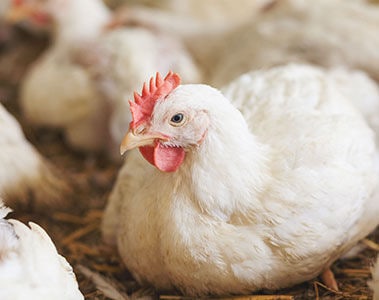
-
Global/EN
- Global
- North America
- Latin America
Direct & indirect livestock emissions are set to grow as demand for animal protein continues to increase to feed an ever growing population. Reducing the environmental footprint associated with livestock production is thus becoming critical in order to meet production targets within planetary boundaries. The good news is that feed ingredients in general, and feed enzymes like DSM ProAct protease in particular, can strongly contribute to reducing both direct & indirect livestock emissions associated with Poultry production (estimated around 5.2 kg CO2e/kg of protein). For the sake of the example; we will set a particular focus on the reduction of Nitrogen emissions.
Manure from intensive poultry production is considered as a significant cause of nitrate & phosphate contamination for both surface and ground waters. Reducing Nitrogen and Phosphorus flows to the environment is central to improving the quality of both surface & ground waters. Currently, Eutrophic & hypertrophic situations, characterized by excessive growth of algae, are encountered in 19% of EU27 rivers and 26% of EU27 lakes.
Manure policies based on stringent nitrate and phosphate targets have already started shaping livestock production in many places. In EU27 for example, Nitrate Vulnerable Zones (NVZs) have been defined, limiting the amount of Nitrogen application to land (maximum of 170kg/ha/year), in order to ensure nitrate levels in water do not exceed defined safe limits (50mg/l). NVZs represent over 2 million km2 and account for over 60% of EU27 agricultural land. In countries like the Netherland, reducing overall nitrogen emissions has even become a political/national challenge as we have seen in the course of 2020 when Dutch farmers vigorously demonstrated their refusal of the restrictions imposed on animal production.
In order to address this emerging nitrogen challenge, manure is key. All EU27 countries currently have a growing surplus of Nitrogen and Phosphorus. Manure N:P ratio often does not match soil needs causing surplus or deficiency of Nitrogen or Phosphorus, and use of inorganic fertilizers to balance. All EU27 countries currently struggle to operate within the EU27 nitrates directive. In some countries, local manure policies oblige farmers to get rid of surplus at a substantial cost. Beyond EU27, other countries like New Zealand for example, have recently been taking legal actions to reduce nitrates emissions.
DSM ProAct, as a feed protease, is improving protein digestibility in poultry diets. This contributes to reduced Nitrogen flow to the environment.
Indeed, the use of DSM ProAct enables to reduce the feed protein content by 0.5-0.8% points, thanks to an improvement of protein utilization by birds (digestibility AID increased by up to 7 percentage points). With a lower protein intake, we logically observe a significant reduction of Nitrogen in manure by up to -17%. Even beyond direct reduction of Nitrogen in poultry manure, DSM ProAct also contributes to reducing Ammonia & overall CO2e indirect emissions while achieving higher animal productivity. At DSM, we estimated (based on DSM ProAct Environmental Sustainability Calculator) that the use of DSM ProAct for the production of one million broilers (corn soy diet formulation), contributes to reducing ammonia emissions by -2.5 tonnes and Nitrogen emissions by -4 tonnes while reducing CO₂e emissions -21 tonnes.
In 2019, DSM recognized four of its biggest APAC customers, representing more than one million ton of broilers feed treated with DSM ProAct for their significant contribution to sustainability. Collectively they contributed to reduce ammonia emissions by more than 560 t/year and to reduce CO2e emissions by more than 3’800 t/year.
In a nutshell, if you want to act now for reducing livestock emissions in Poultry production, rely on DSM ProAct and its 10 years of a proven track record to make the difference.
If not us, who?
If not now, when?
So, together let’s make it possible!
18 January 2021
Guillaume Trépo is Global Portfolio Lead for feed Enzymes. He holds a Master in Agronomy with a specialty in Biotechnologies, obtained at Ecole Nationale Supérieure d’Agronomie in Toulouse (France), completed by an MBA from HEC-Paris.
Guillaume has worked more than 20 years in Agriculture, through various Sales & Marketing positions at local, regional & global level. Guillaume joined DSM Global Specialty Team 2 years ago.
We detected that you are visitng this page from United States. Therefore we are redirecting you to the localized version.